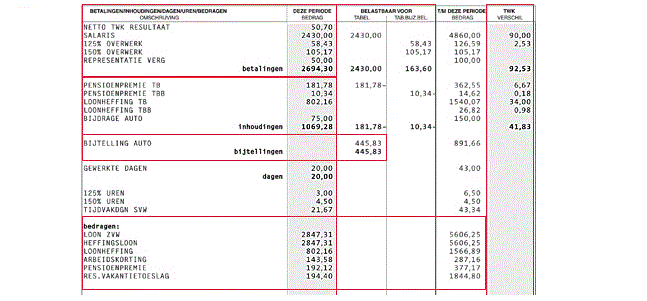
The pay slip has been simplified by the ULB (Standardisation Wage Concept Act). The amount of information has been reduced and all the tax and premium amounts are calculated over one single amount. The main difference is that, compared to the current pay slip, employees no longer have to pay a contribution to the ZVW (Health Insurance Act). All these costs are now charged to the employer, which means that employees no longer have to pay taxes over this amount.
More clarity?
According to Dik van Leeuwerden, manager of the Knowledge Centre for Laws and Regulations of the ADP, ‘The pay slip has been made well-organised but that does not mean that it has become any clearer. For instance, employees driving to and from work in a company car have to be on their toes: The benefits of a company car will from now on be calculated into the employee’s insurance and you will build up benefits allowances as long as the wage is not higher than the maximum premium wage.’
Financial consequences
The financial consequences of the standardisation wage concept depend on the build-up of staff numbers and the wage structure. Especially those organisations that employ a lot of part timers, who earn relatively low incomes, suffer from the abolition of franchising in the Awf-premium. Those employees are no longer part of the franchise and therefore have to pay the WW-Awf premium over the total wage. For employers with a lot of employees on a premium wage higher than the maximum premium wage, doing away with the franchise is favourable. Since January, for drivers of lease-cars, the addition is included in the wage for the employee insurance. Financial consequences are especially felt by companies employing a lot of employees driving company cars and who earn a wage under the maximum premium wage.
The future
For quite some time now all sorts of ways are thought of to simplify the elaborate and complicated wage slip. In a Whitepaper of ADP on the standardisation of wage concept and pay roll tax, Gerard van Westen says that the Wage Concept Standardisation Act serves a higher purpose. According to ‘The Hague circles’, this will be necessary in order to be able to introduce pay roll tax eventually. This would mean that income tax, premiums and income dependable contributions to the Health Insurance Act will all be combined in one percentage which will be deducted and paid by the employer. An employee would no longer be confronted with deductions on their wage. Van Westen is not very enthusiastic. According to him, experts in this field are also apprehensive. This pay roll tax would only carry over the fiscal problems from the employer on to the employee.
Source: P&O Actueel
